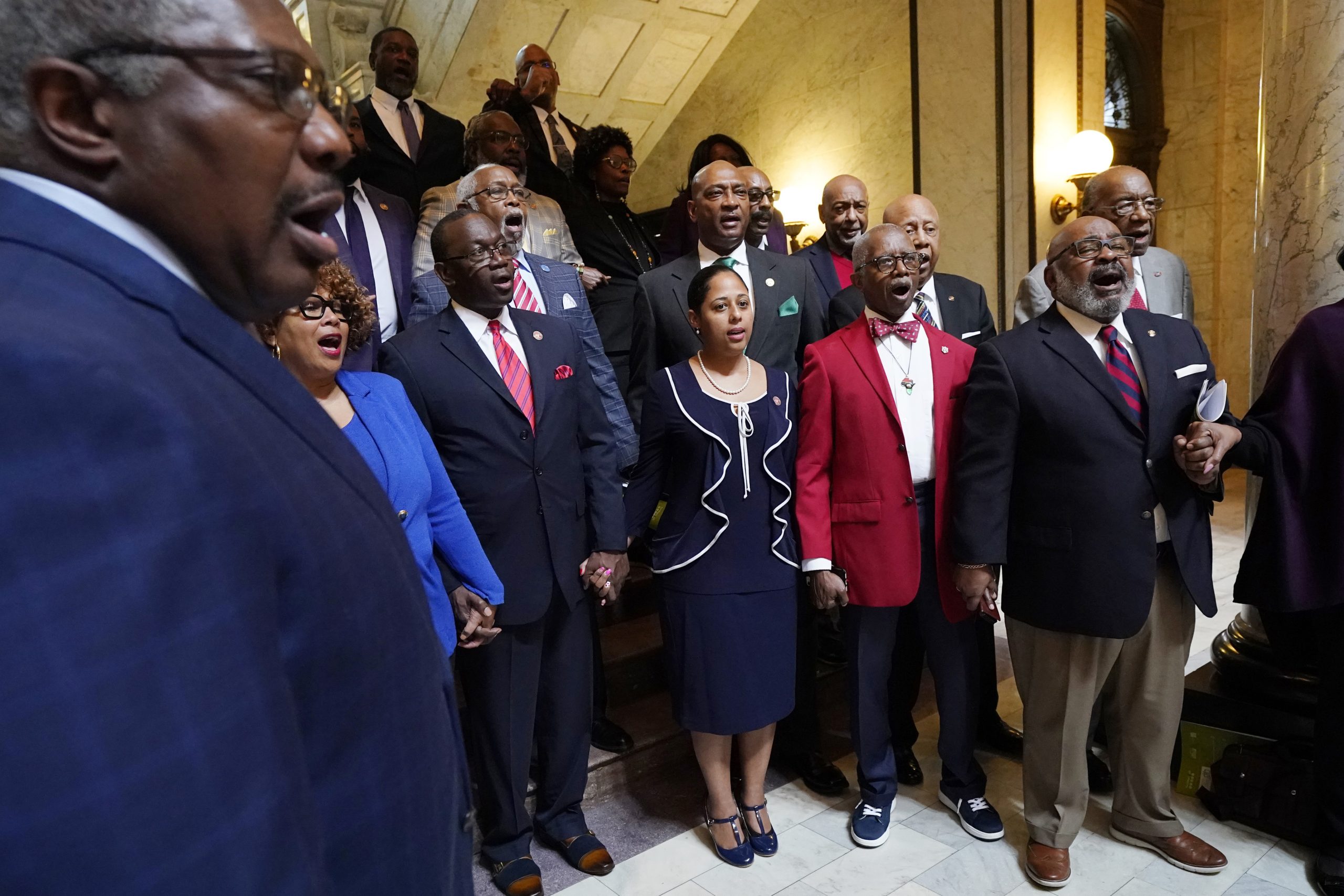Mississippi Today
Republicans don’t have to listen to their Black colleagues. That’s how they designed it.

Republicans don't have to listen to their Black colleagues. That's how they designed it.
Note: This editorial anchored Mississippi Today's weekly legislative newsletter. Subscribe to our free newsletter for exclusive access to legislative analysis and up-to-date information about what's happening under the Capitol dome.
Mississippi Republican legislative leaders don't have to listen when their Black colleagues tell them that they're stripping voting power from Black Mississippians.
They don't have to listen when they're told that they're passing a bill that is bound for yet another federal court battle, that they're stoking racial division across the state, that they're once again drawing horrible national attention, that they're dragging Mississippi back in time.
Republicans have carefully created for themselves a legislative body with virtually unlimited and unchecked power. It allows them to completely shut people who don't look like them or think like them out of the legislative process, and they often use it to pass legislation that stretches the limits of democracy.
This is no accident. Over the past 30 years, as Mississippi's electorate shifted from the Democratic to Republican Party, Republicans used their newfound power to strategically redraw legislative districts and give themselves supermajority control of both the Senate and House. They can, without any say whatsoever from Democrats, pass any bill they want. Inside the Capitol, a small handful of GOP leaders have drawn up rules that give them all the power, and rank-and-file legislators — including the vast majority of Republican legislators — wield little influence over what passes or fails.
Democrats, meanwhile, the party of the overwhelming majority of Black Mississippians, have no voting power at all inside the Capitol. They can give impassioned speeches at the wells, they can stretch debates to four-plus hours, they can walk off the floor to protest racist bills, they can hold fiery press conferences, but they cannot stop Republicans from passing any single piece of legislation.
There is almost never partisan compromise. There is rarely genuine debate. There is plenty of one-sided control.
READ MORE: The purposefully broken lawmaking process in Jackson
With this power, Republicans have passed all sorts of legislation the past couple years despite vocal pushback from Black lawmakers: a critical race theory ban, which famously led every Black senator to walk off the floor in protest before the final vote; tighter legislative and congressional redistricting maps that diluted Black voting strength; the nation's strictest voting laws in a state with a sordid, racist history; massive tax cuts that disproportionately affect poor and Black taxpayers; and anti-LGBTQ legislation that threatens the lives of a vulnerable population.
But perhaps no legislation better showcases the unilateral GOP control under the dome better than House Bill 1020, which passed the House late in the evening of Feb. 7.
Yes, the national headlines you read last week were accurate: A mostly-white House supermajority passed a bill that would create a completely white-appointed judicial district and expand the police force within the whiter areas of Jackson, the Blackest large city in America.
For more than four hours, Black House members delivered what should be certainly considered some of the most cautionary and impassioned speeches ever made in the Mississippi State Capitol building. Many of their comments echoed ones made by their predecessors in the building and civil rights leaders of 60 years ago.
Rep. Ed Blackmon, D-Canton: “Only in Mississippi would we have a bill like this, with our history, where you say solving the problem is taking the vote away from Black people because we don't know how to choose our leaders … This is just like the 1890 Constitution all over again. We are doing exactly what they said they were doing back then: ‘Helping those people because they can't govern themselves.'”
Rep. Solomon Osborne, D-Greenwood: “I don't even know why I'm down here, frankly, because it's like being at a Klan rally with people with suits on. That's the only difference I see between these people here. They wear suits rather than sheets … Every day we get up here and open this body with prayer. I wonder what God are these people praying to?”
Rep. John Hines, D-Greenville: “Again, we end up being the laughingstock of America because of what we do here today.”
While Black House members were doing all they could to plead with the humanity of their GOP colleagues, a large number of Republicans left the House floor altogether for a majority of the debate, reappearing from the back halls of the Capitol to cast a final “yea” vote. House Speaker Philip Gunn sat on the speaker's dais leaned back in his chair with his legs crossed, talking regularly with various Republicans who came to visit with him. Rep. Trey Lamar, the GOP leader who authored and defended House Bill 1020 on the floor floor, sat behind the well and scrolled his phone.
They didn't seem to listen to what their Black colleagues were saying. They didn't have to.
Now the bill moves to the Senate, in recent years the more moderate of the two chambers. But it's an election year, and Republicans believe nothing seems to motivate Republican voters more than being “tough on crime.” And this is Mississippi, so being tough on crime in the Blackest city in America is probably not the worst thing for Republicans who want to go home and flaunt their GOP bonafides.
Considering legislative Republicans have passed legislation in recent years that they knew would face federal lawsuits to hopefully draw the attention and reforming action of the U.S. Supreme Court — remember Dobbs v. Jackson Women's Health Organization? — it's difficult to write off anything that moves through the Mississippi State Capitol.
Meanwhile, the Republican supermajority rolls on for at least six more weeks this session. And if you're hoping political change is on the horizon, there's more bad news. According to a recent Mississippi Today analysis of this year's legislative elections, there's no possible way the GOP will lose control.
For at least four more years, the current trajectory of policy making in Mississippi could very well continue.
READ MORE: Republicans again a lock to control Legislature after November election
This article first appeared on Mississippi Today and is republished here under a Creative Commons license.
Mississippi Today
On this day in 1945


April 29, 1945

The memoir by Richard Wright about his upbringing in Roxie, Mississippi, “Black Boy,” became the top-selling book in the U.S.
Wrighyt described Roxie as “swarming with rats, cats, dogs, fortune tellers, cripples, blind men, whores, salesmen, rent collectors, and children.”
In his home, he looked to his mother: “My mother's suffering grew into a symbol in my mind, gathering to itself all the poverty, the ignorance, the helplessness; the painful, baffling, hunger-ridden days and hours; the restless moving, the futile seeking, the uncertainty, the fear, the dread; the meaningless pain and the endless suffering. Her life set the emotional tone of my life.”
When he was alone, he wrote, “I would hurl words into this darkness and wait for an echo, and if an echo sounded, no matter how faintly, I would send other words to tell, to march, to fight, to create a sense of the hunger for life that gnaws in us all.”
Reading became his refuge.
“Whenever my environment had failed to support or nourish me, I had clutched at books,” he wrote. “Reading was like a drug, a dope. The novels created moods in which I lived for days.”
In the end, he discovered that “if you possess enough courage to speak out what you are, you will find you are not alone.” He was the first Black author to see his work sold through the Book-of-a-Month Club.
Wright's novel, “Native Son,” told the story of Bigger Thomas, a 20-year-old Black man whose bleak life leads him to kill. Through the book, he sought to expose the racism he saw: “I was guided by but one criterion: to tell the truth as I saw it and felt it. I swore to myself that if I ever wrote another book, no one would weep over it; that it would be so hard and deep that they would have to face it without the consolation of tears.”
The novel, which sold more than 250,000 copies in its first three weeks, was turned into a play on Broadway, directed by Orson Welles. He became friends with other writers, including Ralph Ellison in Harlem and Jean-Paul Sartre and Albert Camus in Paris. His works played a role in changing white Americans' views on race.
This article first appeared on Mississippi Today and is republished here under a Creative Commons license.
Mississippi Today
Podcast: The contentious final days of the 2024 legislative session

Mississippi Today's Adam Ganucheau, Bobby Harrison and Geoff Pender break down the final negotiations of the 2024 legislative session's three major issues: Medicaid expansion, education funding, and retirement system reform.
This article first appeared on Mississippi Today and is republished here under a Creative Commons license.
Did you miss our previous article…
https://www.biloxinewsevents.com/?p=353661
Mississippi Today
Lawmakers negotiate Medicaid expansion behind closed doors, hit impasse on state budget
House and Senate Republicans continued to haggle over Medicaid expansion proposals Sunday, and the state budget process hit a snag after leaders couldn't reach final agreements by a Saturday night deadline on how to spend $7 billion.
House Speaker Jason White on Sunday told his chamber that Medicaid expansion negotiators from the House and Senate had been meeting and he expected a compromise “will be filed by Monday or Tuesday at the latest.”
House Medicaid Chairwoman Missy McGee said the Senate had delivered another counter proposal on expansion Sunday evening but declined to provide details. Her Senate counterpart, Medicaid Chairman Kevin Blackwell, declined comment on Sunday. The two leaders met in McGee's office on Sunday evening following a Saturday afternoon meeting.
READ MORE: House, Senate close in on Medicaid expansion agreement
Lawmakers have for the past couple of months been debating on how to expand Medicaid coverage for poor Mississippians and help the state's flagging hospitals. The House initially voted to expand coverage to an estimated 200,000 people, and accept more that $1 billion a year in federal dollars to cover the cost, as most other states have done. The Senate initially passed a far more austere plan, that would cover about 40,000 people, and would decline the extra federal money to cover costs.
Since those plans passed, each has offered counter proposals, but no deal has been reached.
A group of about 50 clergy, physicians and other citizens who support full expansion showed up at the Capitol on Sunday to sit in the Senate gallery and deliver letters to key leaders who are negotiating a final plan.
“When we stand before the Lord, he's not going to ask how much money did you save the state. He's going to ask you what you did for the least of these,” Monsignor Elvin Sounds, a retired Catholic priest, said outside the Senate gallery on Sunday.
READ MORE: A solution to the Republican impasse on Medicaid expansion
Lawmakers hit an impasse on setting a $7 billion state budget and missed Saturday night's deadline for filing appropriations bills. This will force the legislature into extra innings, and require lawmakers to vote to push back deadlines. Lawmakers had expected to end this year's session and leave Jackson by early this week. But House Speaker Jason White told his chamber on Sunday they should expect to continue working through Friday, “and possibly through Saturday or Sunday.
White later said of the budget impasse, “When you get to haggling over spending $7 billion, folks are going to have disagreements.”
Lt. Gov. Delbert Hosemann, who presides over the Senate, said “things are fluid. But everybody is working.”
He looked at his watch and said “It is 5 o'clock. By 6 o'clock what I tell you will have changed.”
White said one reason for the session having to run extra innings is that when he became speaker he vowed to House members that he would not continue the practice of passing much of the state budget last-minute, late at night or in the wee hours of the morning with little or no time for lawmakers to read or vet what they are passing.
He said the House was prepared early Saturday night to file budget bills with agreed-upon numbers, but not to file “dummy bills” with zeros or blanks and continue haggling a budget late into the night.
“I made a promise that we are not going to keep them up here until midnight, then plow through all these budget bills,” White said. “We had had a gentleman's agreement (between the House and Senate) earlier in the session to negotiate a budget by April 15. That didn't happen … We are not going to do everything last minute with no time for our members to read things and ask questions. We are not going to do it in the middle of the night.”
READ MORE: Senate negotiators a no-show for second meeting with House on Medicaid expansion
This article first appeared on Mississippi Today and is republished here under a Creative Commons license.
-
Local News4 days ago
Sister of Mississippi man who died after police pulled him from car rejects lawsuit settlement
-
Mississippi Today4 days ago
At Lake High School in Scott County, the Un-Team will never be forgotten
-
Mississippi Today1 day ago
On this day in 1951
-
Mississippi News2 days ago
One injured in Mississippi officer-involved shooting after chase
-
Mississippi News7 days ago
Cicadas expected to takeover north Mississippi counties soon
-
Mississippi News6 days ago
Viewers make allegations against Hatley teacher, school district releases statement – Home – WCBI TV
-
Mississippi News Video5 days ago
Vehicle struck and killed man lying in the road, Alcorn County sheriff says
-
Mississippi News4 days ago
Ridgeland man sentenced for molesting girl



































